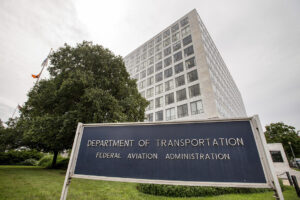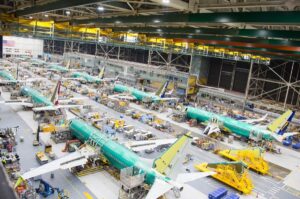The Federal Aviation Administration’s decision to withhold clearance for Boeing to increase production of its popular 737 Max, pending quality improvements, is a significant development in the aviation industry.
May 30, Washington-The Federal Aviation Administration (FAA) remains strict regarding Boeing 737 MAX production. Before allowing any increase, the FAA is waiting for quality improvements to be executed. Boeing has presented a quality improvement plan to the FAA, which includes investing in workforce training, simplifying processes, and enhancing safety culture. However, the FAA still needs to approve an increase in production.

The Department of Transportation Federal Aviation Administration building in Washington
In January, the FAA issued a 90-day ultimatum to Boeing to address production and quality issues after a door plug blowout incident on an Alaska Airlines flight. The incident, which occurred just minutes into the flight of a new 737 Max 9, was caused by the aircraft’s lack of critical bolts to secure the door plug. Since then, Boeing has given a timeline for presenting quality improvements in their aircraft.
As a follow-up to the instructions, Boeing CEO Dave Calhoun and other top company executives presented the plan on May 30 to FAA Administrator Mike Whitaker and other agency officials. However, Whitaker stated that he expects Boeing to receive approval for increased production “in the next few months” and has not yet discussed the issue with Boeing.
He said,
“We will not approve production increases beyond the current cap until we’re satisfied,”.
After a roughly three-hour meeting, Whitaker said at a press conference that Boeing’s work was far from complete and that the strong agency oversight of the company would continue. Senior FAA leaders would meet with Boeing every week to review their performance metrics.
He said,
“Boeing has laid out their roadmap, and now they need to execute,” .
On May 23, Boeing Chief Financial Officer Brian West said the company expects to burn cash this year instead of generating it. Boeing expects to use about $4bn for the current quarter alone.
Following the deadly crashes of two Max jetliners in 2018 and 2019, in which 346 people were killed, the company is trying its best to save its reputation. Charges were claimed on the company for allegedly deceiving regulators about a flight-control system that was implicated in the crashes.

The Boeing 737 Max 8 involved in the deadly crashes in 2018 and 2019
Two weeks ago, the Justice Department said that Boeing violated the terms of a 2021 settlement that allowed it to avoid prosecution for fraud, hence being charged.
Boeing’s Plan
According to reports, Boeing mentioned some steps taken by the company on its workforce. Three hundred hours of training material and workplace coaches were introduced to include production.
Also, the company decluttered managers’ schedules so they could spend more time in the factories. Stephanie Pope, chief executive of Boeing’s commercial airplane unit, said that the plan includes actions that encompasses actions in four categories:
- Workforce Training: Boeing aims to enhance the skills and knowledge of its workforce to improve production quality.
- Process Simplification: The company plans to streamline processes to reduce complexity and improve efficiency.
- Defect Elimination: Boeing is committed to identifying and eliminating defects in the production process.
- Safety and Quality Culture: The focus is on fostering a culture of safety and quality throughout the organization.

Boeing 737 Max production line in Washington
Despite Boeing’s efforts, the FAA has not yet approved an increase in 737 MAX production. The agency is cautious and wants to ensure that the proposed improvements are effectively implemented before allowing any scaling up of production.
In a nutshell, while Boeing is actively working on quality enhancements, the FAA remains vigilant and has not granted clearance for increased production at this time .
